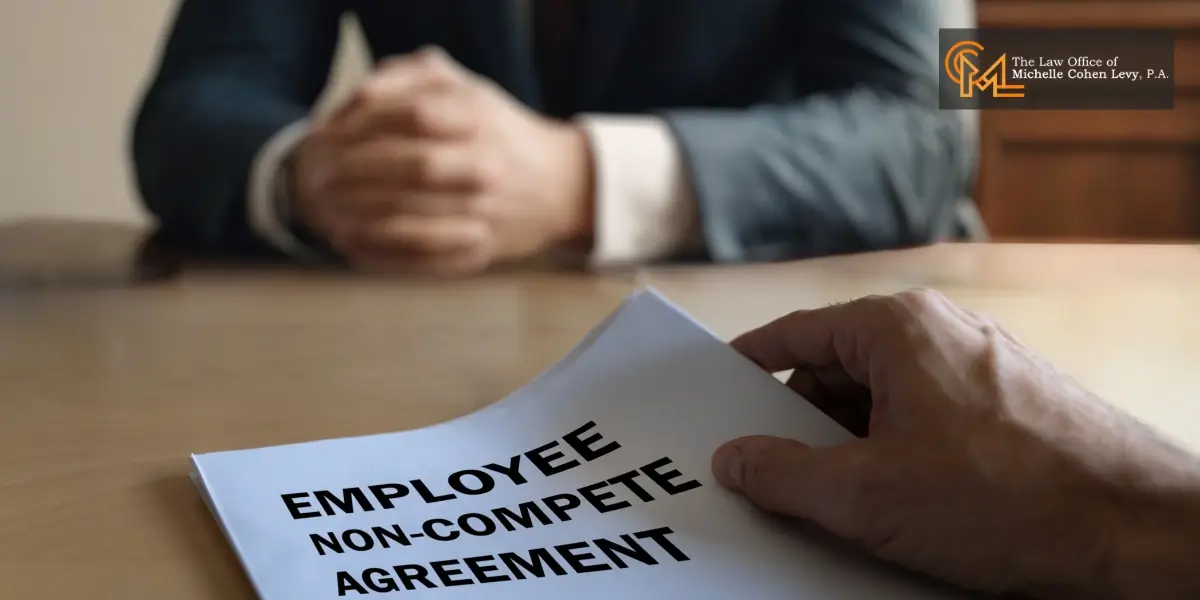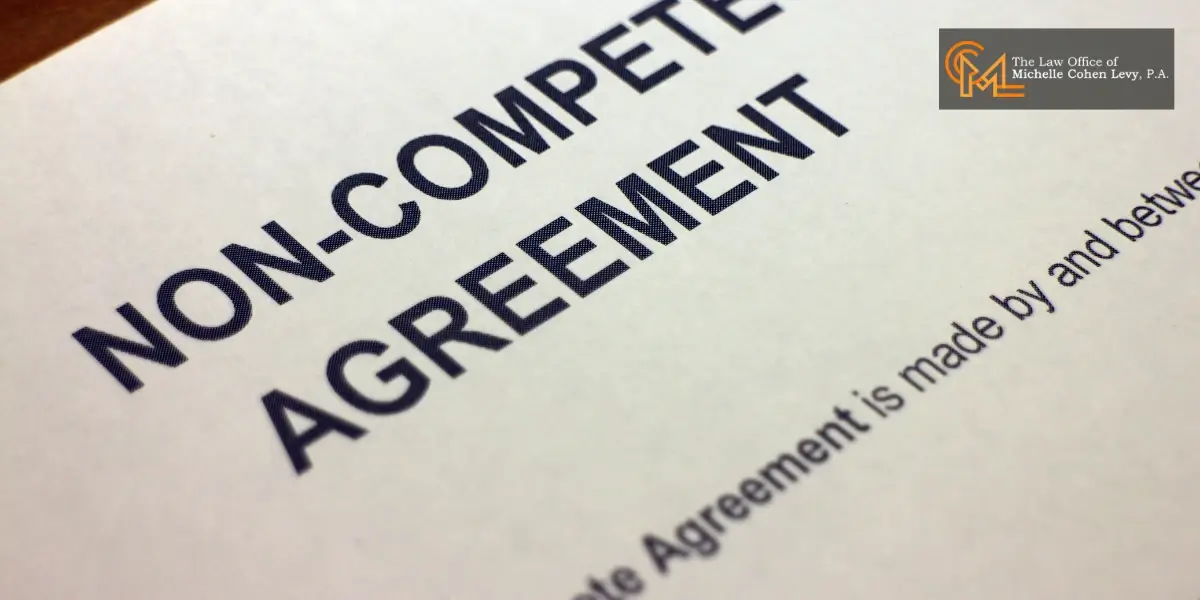Miramar Non-Compete Lawyer
Miramar Non-Compete Attorney

Businesses usually include non-compete clauses in their employment contracts for good reasons. They want to protect intellectual property and prevent competitors from gaining access to valuable insider information. Non-competes aren’t always legal. If you’re trying to get out of what might be an unenforceable non-compete agreement, you can hire a Miramar non-compete lawyer to help.
Trust The Law Office of Michelle Cohen Levy, P.A.
The Law Office of Michelle Cohen Levy, P.A., practices exclusively in employment law, including challenging the enforceability of non-compete agreements. Our small, experienced team treats every case with the personalized care that it deserves. If you need a Miramar employment lawyer, you can stop your search. We can help.
Need Legal Help? Click Here to Take the First Step!
Why Hire a Non-Compete Lawyer?
Around one in five American workers is subject to a non-compete agreement as part of their employment contract. Florida has one of the most anti-competitive noncompete regimes in the country, allowing employers to enter into these agreements for up to four years.
Florida makes it uniquely difficult to challenge non-compete agreements, but that doesn’t mean you should give up hope. It means you should hire a non-compete lawyer who can help you understand your options and provide you with a way forward. Non-compete lawyers can identify wording and other issues that might make these employment clauses legally unenforceable, making it easier for you to get out of them if necessary to progress in your career.
What Is a Non-Compete Agreement?
A non-compete agreement (NCA) is a contractual clause that states an employee may not work for competing businesses or open a similar company for a certain amount of time or within a certain geographic distance following employment at the company. Employers generally use these agreements to protect trade secrets and sensitive information, or to prevent former employees from poaching clients. In many cases, a less restrictive tool like a narrowly tailored non-solicitation agreement can protect an employer’s client relationships without imposing the same career limitations on a worker.
The problem with non-compete agreements is that they aren’t always enforceable. The terms of the non-compete agreement must be reasonable in regard to both time and geographic area. If the courts find that these terms are unreasonable and constitute a restraint of trade, they may decide not to enforce the NCA.
Florida’s Unique Stance on NCAs
Most states that have passed laws regarding non-compete agreements have done so to restrict their scope or even ban them entirely. Florida has taken the opposite approach, passing legislation that protects businesses’ rights to enforce NCAs and makes it easier for them to do so. Even in Florida, though, there are restrictions on the enforceability of non-competes. The legal landscape is also shaped by recent federal action on non-compete agreements, which adds another layer of complexity to their enforcement. To be enforceable, a non-compete agreement must:
- Protect a legitimate business interest. The employment clause must clearly state what the company wants to protect by enforcing an NCA.
- Limit the scope. Any prohibitions on geographic area must be reasonable. These prohibitions cannot prevent employees from working in similar industries.
- Be limited in duration. In most places, there’s no set time an NCA can last. Florida has set a limit of four years via the Florida CHOICE Act. This Act was enacted in 2025.
- Supported by valid consideration. Unless the NCA is part of the employment agreement, employees subject to it must receive valid consideration for signing it, meaning they must receive something of value in exchange for signing. Continued employment is not enough consideration.
In most places, courts err on the side of workers’ rights when choosing whether to enforce non-compete agreements. Florida restricts courts’ ability to uphold workers’ rights over those of businesses that put NCAs in place, but that doesn’t mean there’s no hope. Not all NCAs are enforceable, and you may be able to get out of yours with the help of a Miramar non-compete attorney.

FAQs
Do Non-Competes Hold Up in Court in Florida?
Non-competes generally hold up in court in Florida, including the Broward County courthouse, as the Sunshine State is relatively friendly to these agreements. For non-competes to be enforceable, they must:
- Protect a legitimate business interest.
- Be reasonable in scope.
- Be in writing.
- Provide the employee with at least seven days to review the contract before signing.
A judge will carefully scrutinize whether the agreement meets all the criteria for an enforceable non-compete agreement in Florida.
How Can You Beat a Non-Compete in Florida?
You can improve your chances of beating a non-compete in Miramar, Florida by hiring a Miramar non-compete attorney. Non-compete attorneys understand how these agreements work and what makes them enforceable or unenforceable. Even if you’re not sure whether your non-compete is legally enforceable, it’s worth asking a lawyer to review your contract. You may find that there is reason to question its enforceability.
Are Non-Competes Enforceable Against Lawyers?
Non-competes are generally unenforceable against lawyers because they are prohibited by professional ethics rules prioritizing the public’s right to choose their own legal counsel. The American Bar Association’s Model Rule 5.6 forbids any agreement that restricts a lawyer’s right to practice law after leaving a firm, which precludes non-competes.
What Is the New Non-Compete Law in Florida?
The new non-compete law in Florida is called the CHOICE Act. Effective as of July 1, 2025, it extends the enforceability of non-compete agreements to up to 4 years and creates a presumption of enforceability. The Act also provides employers with a more streamlined process for obtaining injunctions against violations. Non-compete clauses must still meet certain legal requirements to be enforceable under the CHOICE Act.
What Should I Look for in a Florida Non-Compete Attorney?
When choosing a Florida non-compete attorney, prioritize deep experience in employment law, familiarity with local courts, and a track record of success. Seek client-focused professionals offering strong communication, transparent fees, and proven negotiation and litigation skills to protect your career mobility. Ensure the attorney is current on Florida reforms for non-competes and verify any reviews.
Your Miramar Non-Compete Lawyer
If you’re concerned that your contract has an overbearing non-compete agreement and it’s preventing you from seeking gainful employment, you should hire a Miramar non-compete lawyer. The Law Office of Michelle Cohen Levy, P.A., can help.
Michelle Cohen Levy focuses her practice on employment law, so she’s experienced with Florida’s non-compete laws. We have helped many clients in Miramar and the surrounding area with their employment matters. Contact us to schedule a consultation.
Contact An Attorney
Committed To Your Interests
I offer free initial phone consultations for all legal matters. I invite you to schedule your assessment today
by completing my online contact form or by calling my Lighthouse Point office at 954-651-9196.

